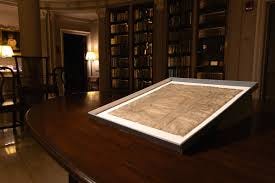When two British researchers recently decided to take a closer look at a Magna Carta in the Harvard Law School Library archives, they didn’t hop the next flight to United States. Instead, they fired up their laptops and searched the library’s online catalog.
Examining the document online, leading Magna Carta experts David Carpenter and Nicholas Vincent, professors of medieval history at Kings College London and the University of East Anglia, were able to determine that the medieval manuscript was no mere copy of the great medieval charter, as had been believed. Instead, the image on their screens, they realized, was that of a rare original, making it one of seven from King Edward I’s 1300 confirmation of Magna Carta that still survive.
‘HLS MS 172,’ as the document is known to researchers, is just one of the thousands of treasures in the law library’s vast holdings that have been digitized in recent decades, enabling scholars or just curious members of the public to explore rich pieces of history, personal archives, legal records and more from thousands of miles away. This work enables people around the globe to “take a look at an artifact and scrutinize it patiently, closely,” and to request additional imaging to support their research, says Jonathan Zittrain ’95, George Bemis Professor of International Law and the law school’s vice dean for Library and Information Services.1
Value of Magna Carta
"I would hesitate to suggest a figure, but the 1297 Magna Carta that sold at auction in New York in 2007 fetched $21m [about £10.5m at the time], so we're talking about a very large sum of money."2
Making a key piece of history available to the world. Harvard Law Today. May 15, 2025.
Cut-price Magna Carta 'copy' now believed genuine. BBC. May 15, 2025.




